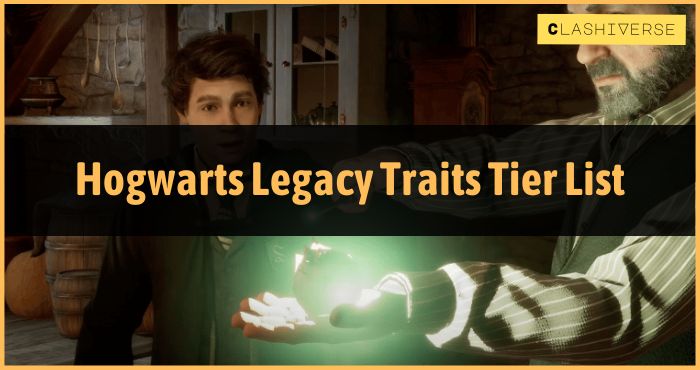Our updated Hogwarts Legacy Traits Tier List is a detailed evaluation of every trait in the game. The list is separated into five categories, with the most effective and appearing on the S tier while the least valuable traits are included on the E tier.
Trait rankings are determined by a number of factors, including damage output, accessibility, and usefulness. With this tier list in your hand, you can decide which traits to prioritize and which to ignore in your quest to become the most powerful wizard at Hogwarts.
For more similar guide, check out our Hogwarts Legacy section.
Related: Hogwarts Legacy Talents Tier List
Hogwarts Legacy Traits Tier List
Hogwarts Legacy S Tier
- Concentration – Boost to all Spell Damage, general but powerful. Easy S Tier
- Ancient Magic Focus – Bonus to Ancient Magic recovery which allows you faster Ancient Magics for big damage. Easy S Tier.
- Binding – Make your Petrificus Totalus Spell even more powerful to kill enemies you normally wouldn’t be able to. Low S Tier.
- Laceration – The highest damage spell in the game doing even more damage. Low S Tier only because it’s just the one spell.
Hogwarts Legacy A Tier
- Ancient Magic – Bonus damage for Ancient Magic means easier kills on big enemies.
- Ambush – Extra Damage from Stealth with any spell you like.
Also see – YBA Tier List
Hogwarts Legacy B Tier
- Unforgivable – More damage to cursed targets. Curses generally lead to death without this but it can be good if you only learn Crucio for some reason.
- Herbology – More Damage dealt with your plants. Not so great for a non-botany build but fantastic if you are using one.
Hogwarts Legacy C Tier
- Fangs – More damage for cabbages. It’s okay but not great even for botany build.
- Venom – More damage for Venomous Tentacula. It’s okay but not great even for botany build.
- Cruelty – More damage from Crucio. Kind of unnecessary.
- Manipulation – Imperio’d enemy deals more damage. Could be good but ultimately not very useful.
Hogwarts Legacy D Tier
- Protego Shielding – Very niche. May be useful for Battle Arenas but not many other places.
- Cushioning – Very niche. May be useful for Battle Arenas but not many other places.
- Explosive – More Damage with Bombarda. The spell isn’t great but it can have it’s uses.
- Destruction – Confrigo is fine but there are just better options.
- Scorching – Incendio is fine as well but this is too niche of a use.
- Deafening – Mandrakes main focus is stunning so doing more damage is kind of pointless.
- Control – Ancient Magic Throw isn’t important enough to focus on.
Hogwarts Legacy E Tier
- Amphibial Protection – Protection and Resistance spells are pointless by the time you get them.
- Goblin-Silver Resistance – Protection and Resistance spells are pointless by the time you get them.
- Necromantic Protection – Protection and Resistance spells are pointless by the time you get them.
- Lupus Protection – Protection and Resistance spells are pointless by the time you get them.
- Disarming – Expelliarmus sucks.
Also see the new – OP Dream Sailor Tier List
Which is the best Trait in Hogwarts Legacy?
Our Hogwarts Legacy Traits Tier List is a useful resource for any budding wizard trying to maximise their game potential. You can make sure that you are using the most powerful options available to you by emphasizing on the attributes listed in the S and A tiers. Although traits in the D & E tiers have a few specific uses, they are typically not worth investing.
Overall, Concentration, which gives a general but significant boost to all spell damage, is the best trait in the Hogwarts Legacy game.
There you have it folks, with this guide, you can create your characters with ease and rise to any challenge Hogwarts throws your way.
Related Article:


